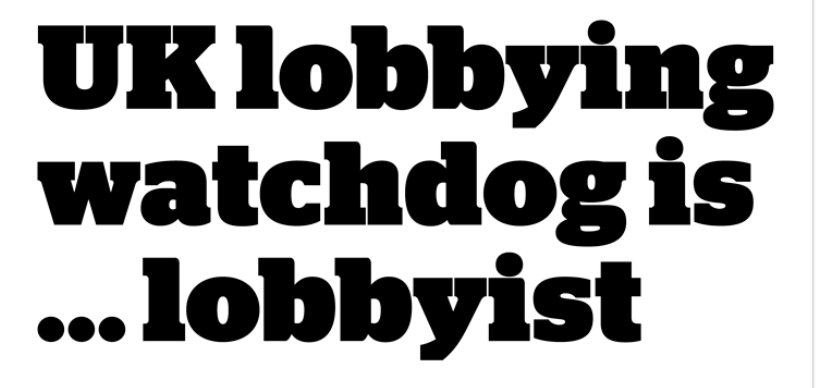We recently carried an editorial on the collapse of Greensill Finance and the swirl of scandal and corruption around it. It is becoming increasingly clear, however, that the stink of dirty dealing is even worse than we thought.
We commented on the fact that the top civil servant who was the head of the government’s procurement arm, Bill Crothers, was appointed as a director of Greensill Finance only months after he left the civil service. It now transpires that he actually worked part-time for Greensill, even while he was still a civil servant. There cannot be any doubt that at the time that this ‘public servant’ was in charge of a department spending £40bn of tax-payers’ money, he was ‘on a promise’ of an even better job in due course. It raises the question in most people’s minds of who exactly he was working for when he was a ‘civil servant’.
The revolving door between the civil service and big business is clearly much wider and more extensive than we are led to believe. It is common practice for budding business executives to be ‘seconded’ to the civil service, as it is for civil servants to be ‘seconded’ in the opposite direction. This is not, as we are told, to give civil servants an ‘insight’ into how businesses are run – anyone with half a brain can work that out or find it out – it is a mechanism to assert a direct and powerful pro-business influence right into the heart of government.
Government: a committee for the promotion of business interests
As a result of the exposure of his own personal role in lobbying on behalf of Greensill Finance, former Tory Prime Minister, David Cameron, has been forced to admit, not only that he worked for Greensill, but that he met with Matt Hancock and texted Rishi Sunak on behalf of the company. Cameron is mortified by the publicity, not because of what he did of course, but because he has been found out.

As the Financial Times has pointed out, “The former prime minister did not break any official rules in exchanging private text messages with senior ministers, nor did Bill Crothers.” That is precisely the point. What for ordinary workers is a scandal and stinks of corruption, is the norm in government circles and it only goes on because it is shrouded in permanent secrecy.
We also learn, according to today’s copy of the i-newspaper, (today’s headline above) that “a senior member of the Government’s own lobbying watchdog runs his own firm advertising his access to ministers at the highest echelons of power”. The person in question, not an elected MP we note, is Andrew Cumpsty, who sits on the Government’s Advisory Committee on Business Appointments (Acoba), the group that is supposed to police the appointment of ex-ministers and civil servants into top jobs in business, supposedly to “guard against conflicts of interest”.
‘guarding against’ conflicts of interest…by a conflict of interest
Yet it now transpires that this “guardian against conflicts of interest”, runs his own lobbying firm that includes housing developers among its clients. His own website boasts that the company “acts as a link between the leaders of UK Industry and the Conservative Party Cabinet”. If this is not a conflict of interest, then nothing is.
Boris Johnson has now initiated an inquiry into Cameron’s bare-faced lobbying, but it will not make the slightest dent in the ongoing and persistent interaction between Tory MPs, top civil servants and big business. It has often been said that government – particularly Tory government – is no more than a committee for the promotion of big business interests. Nothing is going to change on that score, either from Johnson’s tame inquiry or the parallel examination announced by a parliamentary committee.
The supposed ‘rules’ of lobbying are based on a statutory register introduced in 2014, but do not cover so-called ‘in-house’ lobbyists like Cameron. It only covers third party “consultant” firms and even then, the whole structure of the ‘monitoring’ is woefully inadequate and thrives on being hidden from public scrutiny.
Gupta companies structures deliberately complex
While we are on the subject of the collapse of Greensill, the company it most significantly affects is the metals and steel conglomerate of Sanjeev Gupta, with its thousands of jobs in the UK. Our editorial also mentioned the fact that Gupta’s empire was deliberately structured in the most complex fashion to maximise government grants, hide financial transfers and dodge taxes.
That has been confirmed in a recent article in the Financial Times (April 15), which points out that “Metals magnate Sanjeev Gupta restructured his business empire last year in an attempt to maximise the amount of UK taxpayer-backed loans he could draw on through the government’s coronavirus lending scheme”.
“…Companies affiliated with Gupta applied for hundreds of millions of pounds of loans via Greensill Capital, which tapped the Coronavirus Large Business Interruption Loan Scheme…New documents seen by the FT show that Gupta incorporated new entities last year to further split up his empire, with the sole purpose of securing more taxpayer-backed loans through Greensill.
“…Separate Singaporean public filings show that in August and September 2020, the industrialist incorporated four new Singaporean holding companies — LRC One, Liberty Steel Newport Holdings, LPH Holdings and Liberty Commodities Holdings — to split up the ownership of several of his British industrial and commodities trading businesses”.
Tax-dodging, complexity and swindling are the norm
Off-shore incorporation, complex ownerships between related companies, tax-dodging and fiddling on a massive scale – these are the norms for British big business. Gupta’s only misfortune was in being found out, when Greensill went bust. But what is normal business practice for most big companies is rightly seen as swindling and corruption by ordinary workers.

For once, a Labour front bench spokesperson, Rachel Reeves, seemed to say something worthwhile. In relation to the lobbying scandal, she told the i-newspaper, “This doesn’t just show that Tories can’t be trusted to reform lobbying – they don’t even know where the line of integrity lies. We need a proper inquiry and to clean up sleaze and cronyism. Instead, the Conservatives voted for another crony cover-up.”
This is absolutely correct, but the Reeves’ drive against corruption would be a lot more convincing if she also campaigned against former Labour ministers who now operate as professional lobbyists, like Starmer’s new ‘adviser’, Lord Mandelson. Reeves might also have mentioned the fact that former Labour First Minister of Wales, Carwyn Jones, is on the Advisory Board of GFG, a Gupta company – while remaining on Labour’s ruling body, the NEC.
Labour needs to be fundamentally different, not Tory-lite
Labour policy has to be a lot firmer on the whole issue of lobbying and a few weasel words about corruption aren’t enough. Labour voters have not forgotten the MPs’ expenses scandal, which exposed the fiddles of MPs of all parties, Tory and (some) Labour alike.
Labour should be a lot clearer. Members of Parliament and civil servants should be banned from having any second jobs, part-time or otherwise. Commercial lobbying MPs and civil servants should be banned. All company payments to former MPs and ex-civil servants should be on a public register for open scrutiny.
As for Liberty Steel, the Gupta company which is now in danger of collapse, Labour should be demanding the ‘clarification’ of its ownership by nationalisation, without compensation, on the grounds that Gupta has already taken his cut of government grants, loans and subsidies. That is the only way of guaranteeing the jobs in the company.
Labour is losing support in its former heartlands, especially in the North and in Scotland. If it is ever to start regaining support among ordinary workers, it must begin to demonstrate that it really is different to the Tories and not just Tory-lite. It must be seen to be not just a ‘little bit’ better, but fundamentally different in its whole approach to sleaze, corruption and cronyism.



